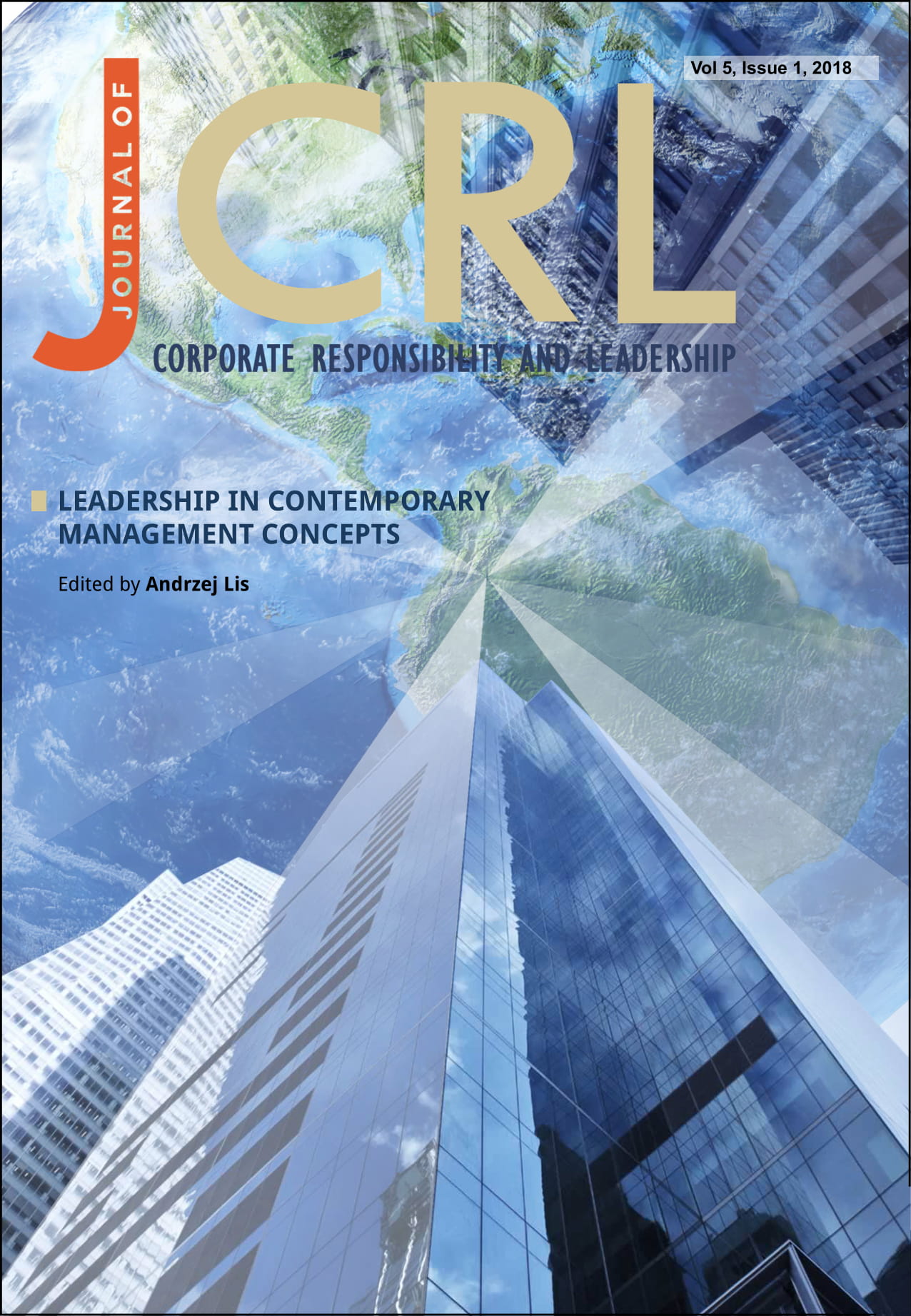Succession of Leadership Position in Non-governmental Organisations: Case studies
DOI:
https://doi.org/10.12775/18717Klíčová slova
succession, non-governmental organisations, qualitative research, case study, PolandAbstrakt
Purpose: The issue of succession in non-governmental organi-sations is very weakly represented in the scientific literature. There is also a lack of discussion on that topic in Polish literature. There exist studies on succession in large companies and family businesses, as well as organisations that allow to analyse easily the impact of succession on their performance (e.g. sport clubs). The aim of the paper is to fill the gap in literature and thus in knowledge and understanding of succession processes in non-gov-ernmental organisations.
Design/methodology/approach: The literature studies showed the need for qualitative research in this field mainly in the form of case studies with concrete succession stories from organisa-tions. The applied method is a multiple case study with elements of the grounded theory approach. Qualitative case studies have been developed based on interviews with CEOs from Polish NGOs.
Findings: The results of the research presented in the paper are the beginnings of theorizing on succession in non-govern-mental organisations in Poland. The synthesis of the collected research material is presented and delineates further research directions.
Research and practical limitations/implications: Conducted case studies provide contextual knowledge about the course and environment of succession processes in NGOs. However, the col-lected material from case studies does not allow generalizations and references to the entire population of the examined type of organisations.
Originality/value: The study on succession in non-governmental organisations is quite unique in the scientific literature devoted to the succession (missing specially specific case studies from NGOs) and almost completely unique in Polish literature. A meth-odological novelty lies also in an attempt to combine the case study method with elements of the grounded theory approach.
Paper type: Research paper.
Reference
Adamska, M. (Ed.) (2014), Przewodnik po sukcesji w firmach rodzinnych: Kompendium wiedzy, PM Doradztwo Gospodarcze sp. z o.o., Kraków.
Allison, M. (2002), “Into the Fire: Boards and Executive Transitions”, Nonprofit Management and Leadership, Vol.12, Issue 4, pp. 341 – 351.
Babbie, E. (2008), Podstawy badań społecznych, PWN, Warszawa.
Boyne, G., Dahya, J. (2002), “Executive Succession and the Performance of Public Organizations”, Public Administration, Vol. 80, Issue 1, pp. 179 – 200.
Dudkiewicz, M. (2009), Technokraci dobroczynności: Samoświadomość społeczna pracowników organizacji pozarządowych, Wydawnictwo Uniwersytetu Warszawskiego, Warszawa.
Fischer, R.M., Comini, G.M. (2008), “When Cinderella Gazes at Herself in the Mirror: The Succession Issue in NGOs”, paper presented at “Eight International Confer-ence on the International Society of Third Sector (ISTR) and Second EMES-ISTR European Conference in Partnership with the CINEFOGO Network of Excellence”, 9 – 12 July 2008, University of Barcelona, Barcelona, Spain.
Friedman, S.D., Olk, P. (1995), “Four Ways to Choose a CEO: Crown Heir, Horse Race, Coup d’Etat, and Comprehensive Search”, Human Resource Management, Vol. 34, Issue 1, pp. 141 – 164.
Giambatista, R.C., Rowe, W.G., Riaz, S. (2005), “Nothing Succeeds Like Succession: A Critical Review of Leader Succession Literature Since 1994”, The Leadership Quarterly, Vol. 16, Issue 6, pp. 963 – 991.
Glaser, B.G., Strauss, A.L. (2009), Odkrywanie teorii ugruntowanej, Zakład Wydawniczy „Nomos”, Kraków.
Gliński, P. (2006), Style działań organizacji pozarządowych w Polsce: Grupy interesu czy pożytku publicznego, Wydawnictwo IFiS PAN, Warszawa.
Herriot, P. (1992), The Career Management Challenge: Balancing Individual and Organizational Needs, Sage Publications, London.
Kesner, I., Sebora, T.C. (1994), “Executive Succession: Past, Present & Future”, Journal of Management, Vol. 20, Issue 2, pp. 327 – 372.
Konecki, K. (2000), Studia z metodologii badań jakościowych: Teoria ugruntowana, PWN, Warszawa.
Kostera, M. (2005), Antropologia organizacji: Metodologia badań terenowych, PWN, Warszawa.
Kwiatkiewicz, A. (2009), “Problemy zatrudnienia w trzecim sektorze w opinii kadry zarządzającej”, in: Bogacz-Wojtanowska, E., Rymsza, M. (Eds.), Nie tylko społec-znie: Zatrudnienie i wolontariat w organizacjach pozarządowych, Instytut Spraw Publicznych, Warszawa, pp. 183 – 209.
McDonald, C., Warburton, J. (2003), “Stability and Change in Nonprofit Organizations: The Volunteer Contribution”, Voluntas: International Journal of Voluntary and Nonprofit Organizations, Vol. 14, Issue 4, pp. 381 – 399.
McKee, M.C., Driscoll, C. (2008), “Creating Stabilizers and Safety Nets for Successors Executives’ High-Wire Act”, Nonprofit Management and Leadership, Vol. 18, Issue 3, pp. 341 – 335.
Meyer-Emerick, N., Momen, M. (2003), “Continuity Planning for Nonprofits”, Non-profit Management & Leadership, Vol. 14, Issue 1, pp. 67 – 77.
Nowak, S. (2008), Metodologia badań społecznych, PWN, Warszawa.
Rothwell, W. (2010), Effective Succession Planning: Ensuring Leadership Continuity and Building Talent from Within, American Management Association, New York. Retrieved from https://hcmindonesia.files.wordpress.com/2012/12/9b-succession-planhandbook.pdf, (accessed 24 May 2017).
Rowe, W.G., Cannella Jr., A.A., Rankin, D., Gorman, D. (2005), “Leader Succession and Organizational Performance: Integrating the Common-sense, Ritual Scapegoating, and Vicious-circle Succession Theories”, The Leadership Quarterly, Vol. 16, Issue 2, pp. 197 – 219.
Santora J.C., Sarros J.C. (2013), “Introduction to the Special Issue on Succession Planning in Nonprofit Organizations”, International Leadership Journal, Vol. 5, Issue 3, pp. 3 – 9.
Santora, J.C., Sarros, J.C., Bauer, J. (2008), “Executive Succession in Non-profit Organizations: What We Know and What We Need to Know”, paper presented at “Eight International Conference on the International Society of Third Sector (ISTR) and Second EMES-ISTR European Conference in Partnership with the CINEFOGO Network of Excellence”, 9 – 12 July 2008, University of Barcelona, Barcelona, Spain.
Silverman, D. (2008a), Prowadzenie badań jakościowych, PWN, Warszawa.
Silverman, D. (2008b), Interpretacja danych jakościowych, PWN, Warszawa.
Sitek, W. (2007), Między rynkiem a civil society: Konteksty badań socjologicznych, Wydawnictwo Naukowe Scholar, Warszawa.
Trzciński, T. (2016), Nowoczesne metody zarządzania i przywództwa w organizacjach typu non-profit, Ridero.
Yin, R.K. (2014), Studium przypadku w badaniach naukowych: Projektowanie i metody, Wydawnictwo Uniwersytetu Jagiellońskiego, Kraków.
Zhang, Y., Rajagopalan, N. (2006), “Grooming for The Top Post and Ending the CEO Succession Crisis”, Organizational Dynamics, Vol. 35, No. 1, pp. 96 – 105.
Stahování
Publikováno
Jak citovat
Číslo
Sekce
Stats
Number of views and downloads: 775
Number of citations: 0



